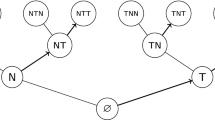Abstract
Diathesis alternation describes the property of language that individual verbs can be used in different subcategorization frames. However, seemingly similar verbs such as drizzle and spray can behave differently in terms of the alternations they can participate in (drizzle/spray water on the plant; *drizzle/spray the plant with water). By hypothesis, primary linguistic data is not sufficient to learn which verbs alternate and which do not. We tested two state-of-the-art machine learning models trained by self supervision, and found little evidence that they could learn the correct pattern of acceptability judgement in the locative alternation. This is consistent with a poverty of stimulus argument that primary linguistic data does not provide sufficient information to learn aspects of linguistic knowledge. The finding has important consequences for machine learning models trained by self supervision, since they depend on the evidence present in the raw training input.
Notes and Comments. This research was supported by the Project News Angler, which is funded by the Norwegian Research Council’s IKTPLUSS programme as project 275872.
Access this chapter
Tax calculation will be finalised at checkout
Purchases are for personal use only
Similar content being viewed by others
References
Baker, C.: Syntactic theory and the projection problem. Linguist. Inquiry 10, 533–581 (1979)
Bender, E.M., Koller, A.: Climbing towards NLU: on meaning, form, and understanding in the age of data. In: Proceedings of the 58th Annual Meeting of the Association for Computational Linguistics, pp. 5185–5198. Association for Computational Linguistics, July 2020. https://www.aclweb.org/anthology/2020.acl-main.463
Berwick, R.C., Pietroski, P., Yankama, B., Chomsky, N.: Poverty of the stimulus revisited. Cogn. Sci. 35(7), 1207–1242 (2011). https://doi.org/10.1111/j.1551-6709.2011.01189.x. ISSN 1551-6709
Chmomsky, N.: Aspects of the Theory of Syntax. MIT Press, Cambridge (1965)
Chomsky, N.: Rules and Representations. Columbia Classics in Philosophy. Columbia University Press (1980). https://books.google.no/books?id=KdYOYJwjFo0C. ISBN 9780231048279
Cowie, F.: Innateness and language. In: Zalta, E.N. (ed.) The Stanford Encyclopedia of Philosophy. Metaphysics Research Lab, Stanford University, Fall 2017 edn (2017)
Devlin, J., Chang, M.-W., Lee, K., Toutanova, K.: BERT: pre-training of deep bidirectional transformers for language understanding. In: Burstein, J., Doran, C., Solorio, T. (eds.) NAACL-HLT (1), pp. 4171–4186. Association for Computational Linguistics (2019). http://dblp.uni-trier.de/db/conf/naacl/naacl2019-1.html#DevlinCLT19. ISBN 978-1-950737-13-0
Ettinger, A.: What BERT is not: lessons from a new suite of psycholinguistic diagnostics for language models. Trans. Assoc. Comput. Linguist. 8, 34–48 (2020). https://doi.org/10.1162/tacl_a_00298
Harris, Z.S.: Distributional structure. WORD 10(2–3), 146–162 (1954). https://doi.org/10.1080/00437956.1954.11659520. ISSN 0043-7956
Kassner, N., Schütze, H.: Negated and misprimed probes for pretrained language models: birds can talk, but cannot fly. In: Proceedings of the 58th Annual Meeting of the Association for Computational Linguistics, pp. 7811–7818. Association for Computational Linguistics, July 2020. https://www.aclweb.org/anthology/2020.acl-main.698
Levin, B.: English Verb Classes and Alternations: A Preliminary Investigation. The University of Chicago Press, The University of Chicago (1993). ISBN 0-226-47532-8
Liu, Y., et al.: Roberta: a robustly optimized BERT pretraining approach. CoRR, abs/1907.11692 (2019). http://arxiv.org/abs/1907.11692
Matthews, B.W.: Comparison of the predicted and observed secondary structure of T4 phage lysozyme. Biochimica et Biophysica Acta (BBA) - Protein Struct. 405(2), 442–451 (1975). https://doi.org/10.1016/0005-2795(75)90109-9. http://www.sciencedirect.com/science/article/pii/0005279575901099. ISSN 0005-2795
Perfors, A., Tenenbaum, J.B., Wonnacott, E.: Variability, negative evidence, and the acquisition of verb argument constructions. J. Child Lang. 37(3), 607–642 (2010). https://doi.org/10.1017/S0305000910000012
Pinker, S.: Learnability and Cognition: The Acquisition of Argument Structure (1989/2013), New edn. MIT Press, Cambridge (2013)
Pinker, S.: The Stuff of Thought : Language as a Window Into Human Nature. Viking, New York (2007)
Sahlgren, M.: The distributional hypothesis. Italian J. Linguist. 20, 33–53 (2008)
Vaswani, A., et al.: Attention is all you need. In: Proceedings of the 31st International Conference on Neural Information Processing Systems, NIPS 2017, Red Hook, NY, USA, pp. 6000–6010. Curran Associates Inc. (2017). ISBN 9781510860964
Veres, C., Sandblåst, B.H.: A machine learning benchmark with meaning: learnability and verb semantics. In: Liu, J., Bailey, J. (eds.) AI 2019. LNCS (LNAI), vol. 11919, pp. 369–380. Springer, Cham (2019). https://doi.org/10.1007/978-3-030-35288-2_30
Wang, A., Singh, A., Michael, J., Hill, F., Levy, O., Bowman, S.R.: GLUE: a multi-task benchmark and analysis platform for natural language understanding. In: The Proceedings of ICLR (2019)
Wang, A., et al.: SuperGLUE: A Stickier Benchmark for General-Purpose Language Understanding Systems (2019)
Wang, W., et al.: Structbert: Incorporating language structures into pre-training for deep language understanding (2019)
Warstadt, A., Singh, A., Bowman, S.R.: Neural Network Acceptability Judgments (2018)
Yang, Z., Dai, Z., Yang, Y., Carbonell, J.G., Salakhutdinov, R., Le, Q.V.: XLNet: generalized autoregressive pretraining for language understanding. CoRR, abs/1906.08237 (2019). http://arxiv.org/abs/1906.08237
Author information
Authors and Affiliations
Corresponding author
Editor information
Editors and Affiliations
Rights and permissions
Copyright information
© 2021 Springer Nature Switzerland AG
About this paper
Cite this paper
Veres, C., Sampson, J. (2021). You Can’t Learn What’s Not There: Self Supervised Learning and the Poverty of the Stimulus. In: Métais, E., Meziane, F., Horacek, H., Kapetanios, E. (eds) Natural Language Processing and Information Systems. NLDB 2021. Lecture Notes in Computer Science(), vol 12801. Springer, Cham. https://doi.org/10.1007/978-3-030-80599-9_1
Download citation
DOI: https://doi.org/10.1007/978-3-030-80599-9_1
Published:
Publisher Name: Springer, Cham
Print ISBN: 978-3-030-80598-2
Online ISBN: 978-3-030-80599-9
eBook Packages: Computer ScienceComputer Science (R0)




